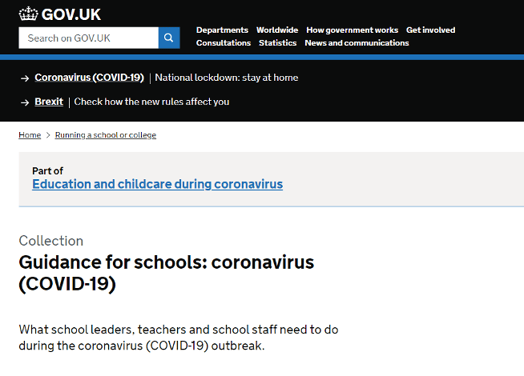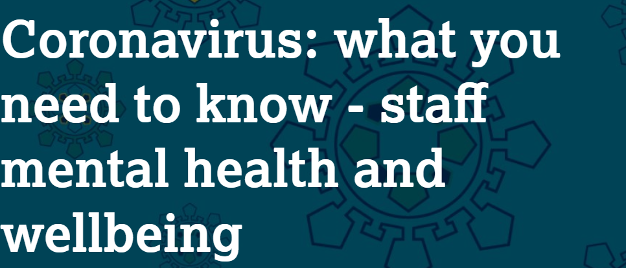I never thought I would see the day where guidance for schools changed on a monthly sometimes weekly basis.
I think many of us are familiar with headlines like this:
Click on the images to visit the websites.
In these unprecedented times I’m proud to say I’m a keyworker & educator who has worked throughout the lockdowns and witnessed superb leadership from school leaders up and down the country.
Like thousands of other teachers, I have permanently pinned to my pc tabs - the Department for Education updates’ page.

For all school leaders it has everything from Guidance for Parents and Carers; Day to Day running of school; Safe working and protective measures; SEND; Remote and online learning; Data collection; Exams and assessments and changes to Regulation and Legislation.
What is missing?
The most important point.
MENTAL HEALTH AND WELLBEING
There simply was not a dedicated section on it.
If I dug deeper and I trawled through each section I later found in the Parents and Carers section Guidance for parents and carers on supporting children and young people’s mental health and wellbeing during the coronavirus (COVID-19) pandemic - Updated last in 16 October 2020 and then I also found Guidance for the public on the mental health and wellbeing aspects of coronavirus (COVID-19)
With headlines like this:
I feel it is important we have a document offering Guidance for schools on supporting school staff mental health and wellbeing.
But where was it?
I had to do another trawl of the internet and was happy to see The National Education Teaching Union prioritising web space to the profession’s mental wellbeing.
And a Back-to-School Guide: Staff wellbeing and support published by SecEd
As You can see there are bits of key mental health support and information scattered all over the internet, on a range of platforms. This is time wasting and clearly not giving mental health and wellbeing the focus, it needs and deserves.
This brings me to what I like about working with Innovating Mind’s Edupod Platform.
This month, against the backdrop of chaotic covid-19 school announcements I have been able to calmly work through the platform analysing the results of the surveys they generated and which we distributed in December. The online platform, managed by clinicians, then analyses the data and produces recommended action plans which we are able to methodically work through - starting with the objectives and then moving on to the action steps which we need to take as a school.
The thoroughness and forensic detail given to supporting school leaders in identifying areas of concern and the related action steps to supporting and embedding a positive mental health and wellbeing approach in our school has been refreshingly organised and managed against the backdrop of the chaos outside our school gates.
From my research mentioned above I have extracted the following website links, chat lines and information on where you can get support with mental health for your child or young person or for yourself as the parent or as the educator.
Helplines and websites for your child and or young person
If your child or young person would like to speak to someone anonymously, they could try calling a helpline or visiting websites such as ChildLine and The Mix.
Shout provides free, confidential support, 24/7 via text for anyone at crisis anytime, anywhere.
You can:
- text SHOUT to 85258 in the UK to text with a trained Crisis Volunteer
- text with someone who is trained and will provide active listening and collaborative problem-solving
ChildLine provides a confidential helpline for any child with a problem. It comforts, advises and protects.
You can:
- call 0800 1111 any time for free
- have an online chat with a counsellor
- check out the message boards
The Mix provides a free confidential helpline and online service that aims to find young people the best help, whatever the problem.
You can:
- call 0808 808 4994 for free – lines are open from 11am to 11pm every day
- access the online community
- email The Mix
Rise Above is a digital resource developed to address health challenges, including COVID-19, in a way that resonates with young people. It offers a digital hub providing young people with a safe and inspiring space where they can learn how to deal with the issues that matter to them and build their resilience and confidence.
Parent/Carers and all - Where to get urgent help for mental health
If you need help for a mental health crisis or emergency, you should get immediate expert advice and assessment.
It's important to know that support is available, even if services seem busy at the moment because of coronavirus.
NHS urgent mental health helplines
NHS urgent mental health helplines are for people of all ages.
You can call for:
- 24-hour advice and support – for you, your child, your parent or someone you care for
- help to speak to a mental health professional
- an assessment to help decide on the best course of care
Find a local NHS urgent mental health helpline
Information:
If you've already been given a crisis line number to use in an emergency, it's best to call it.
If you just need to talk, any time of day or night
Free listening services
These services offer confidential advice from trained volunteers. You can talk about anything that's troubling you, no matter how difficult:
- Call 116 123 to talk to Samaritans, or email: jo@samaritans.org for a reply within 24 hours
- Text "SHOUT" to 85258 to contact the Shout Crisis Text Line, or text "YM" if you're under 19
If you're under 19, you can also call 0800 1111 to talk to Childline. The number will not appear on your phone bill.
Information:
Coping during a crisis
The mental health charity Mind has information on ways to help yourself cope during a crisis.
This includes calming exercises and a tool to get you through the next few hours.
School staff - where to get urgent help for mental health.
The Education Support Partnership supports the mental health and wellbeing of education staff in schools, colleges and universities. Call the helpline on 08000 562 561.
Some staff, particularly leaders, will sadly need to offer support to children who have lost a loved one or who have a family member who is seriously ill. The Charity Winston’s Wish provides guidance and resources for schools.
Mind has published useful guidance on coronavirus and wellbeing.
Contact details for Samaritans.
Mental Health First Aid (England) includes resources for teachers and for working remotely. at home. If your symptoms don’t improve, contact your GP surgery.
GPs are still offering telephone and video consultations throughout the coronavirus crisis.



.png?width=600&name=Copy%20of%20SAVE%20THE%20DATE%20(7).png)